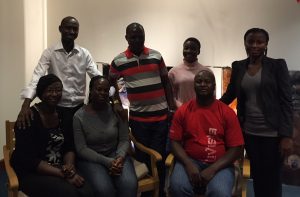 The University of Rhode Island Coastal Resources Center (URI CRC) is proudly hosting seven graduate students from Africa, with affiliations at several colleges, who are, with CRC guidance, pursuing URI master’s and doctoral degrees in varied fields to ultimately help build the capacity of their own communities to engage in innovative coastal management planning and practice. CRC is engaged in extensive coastal management and fisheries related projects in the countries of Ghana and Malawi; bolstering the professional development of emerging leaders and in-country practitioners is a critical aspect of the work — a focus emphasized by URI President David M. Dooley at his recent meeting with University of Cape Coast/Ghana (UCC) leadership to initiate a learning exchange between the schools. Funding for the graduate student effort is provided by the U.S. Agency for International Development (USAID). While one student, Evans Arizi of Ghana, is already well underway with his URI study program, six more are embarking this semester. From Ghana: Rosina Cobbina, Ivy Gyimah, Vida Osei and Evelyn Takyi. From Malawi: Innocent Gumulira and Elliot Lungu. Please join CRC in extending a warm welcome to this student group.
The University of Rhode Island Coastal Resources Center (URI CRC) is proudly hosting seven graduate students from Africa, with affiliations at several colleges, who are, with CRC guidance, pursuing URI master’s and doctoral degrees in varied fields to ultimately help build the capacity of their own communities to engage in innovative coastal management planning and practice. CRC is engaged in extensive coastal management and fisheries related projects in the countries of Ghana and Malawi; bolstering the professional development of emerging leaders and in-country practitioners is a critical aspect of the work — a focus emphasized by URI President David M. Dooley at his recent meeting with University of Cape Coast/Ghana (UCC) leadership to initiate a learning exchange between the schools. Funding for the graduate student effort is provided by the U.S. Agency for International Development (USAID). While one student, Evans Arizi of Ghana, is already well underway with his URI study program, six more are embarking this semester. From Ghana: Rosina Cobbina, Ivy Gyimah, Vida Osei and Evelyn Takyi. From Malawi: Innocent Gumulira and Elliot Lungu. Please join CRC in extending a warm welcome to this student group.
Blog Archives
US Ambassador Jackson calls on Fisher folk in Ghana to Allow Children to Grow in their Home Environment and Develop Well
“Just like fish, Big is Good; Small is Bad!”
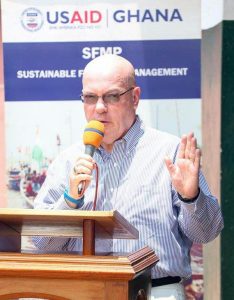
August 12, 2016 – The United States Ambassador to Ghana, Robert P Jackson on Friday, appealed to fisher folk in Elmina, an important fishing port in the Central Region, to maintain children in their home environment with their families and offer them good education instead of trafficking them into child labor-related activities that affect their health and ability to develop properly in life. Ambassador Jackson made the call when he visited the fishing community, which is a focal site of the USAID-funded Sustainable Fisheries Management Project (SFMP), implemented by the Coastal Resources Center (CRC) at the Graduate School of Oceanography, University of Rhode Island.
He interacted with fisher folk and anti-Child Labor Advocates in the Elmina port area and neighboring fishing communities where the project is implementing a behavior change communications campaign against child labor and trafficking in the fisheries sector. This work is supported by the US Government global Feed the Future Initiative.
Mr. Jackson was accompanied by the Mission Director of the United States Agency for International Development – USAID/Ghana – Andrew Karas and other US Government officials.
In 2016, Ghana has for two years in a row been classified as a Tier 2 Watch List Country by a US State Department as detailed in the most recent Trafficking in Persons Report; which concluded that the Government of Ghana does not meet all the minimum requirements for the elimination of trafficking in persons. Under US law, a classification for a third year in a row could result in significant reductions in US foreign assistance to Ghana.
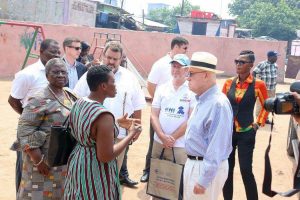
Consequently, the Ambassador’s visit to the SFMP focal site was intended to learn more about this issue in the fisheries sector the related SFMP project interventions to combat this problem in the Central Region; a region noted as source communities for child recruitment into fisheries-related child labor and trafficking activities.
The Chief of Party of the project, Dr. Brian Crawford, who is also a senior manager at CRC, noted that child labor and trafficking in fisheries had worsened due to declining fish harvests and increasing poverty in coastal fishing communities where there are hardly any other viable forms of livelihoods. “Female-headed single-parent households with large families are most vulnerable to child labor and trafficking activities; and many parents give their children away to others for a fee, oblivious to the maltreatment meted out to the children”, noted Dr. Crawford. Many of these children are forced into dangerous fisheries labor practices and are not kept in school, which is illegal under Ghana law.
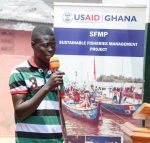
Participants in the visit, organized by the Central and Western Region Fishmongers Improvement Association, included child labor and trafficking victims, who have now become advocates as a result of the project intervention, narrated life threatening experiences as victims and related success stories after benefiting from Advocacy Training on child labour and trafficking.
“As it is with fish, so it is with children. Big is Good; Small is Bad! Just as we should not harvest the juvenile fish, so must we leave children in their environment and homes with their families to enjoy education, and so on; so they can develop well instead of sending them away into child labor”, stressed Ambassador Jackson.
USAID Awards URI $24 Million to Lead Sustainable Fisheries Project in Ghana
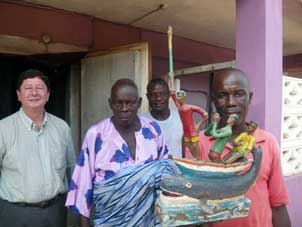
The United States Agency for International Development (USAID) has awarded a $24 million grant to the Coastal Resources Center (CRC) at the University of Rhode Island’s Graduate School of Oceanography to lead a five-year sustainable fisheries project in Ghana, West Africa. The grant is the largest in URI history.
The objective of the USAID/Ghana Sustainable Fisheries Management Project is to rebuild key marine fisheries stocks through responsible fishing practices.

“This will be a very challenging and ambitious project. If successful, our work with the Ghana Ministry of Fisheries and Aquaculture Development will reverse the trend in declining fish catches,” said Brian Crawford, who will move to Accra, Ghana to lead the project for URI. “With improved management, tens of thousands of metric tons of high-quality, low-cost fish protein supply can be recovered, benefiting not only tens of thousands of fishermen and women processors, but improving food security for millions of people in Ghana and its neighbors in West Africa.”
The project is part of USAID’s Feed the Future Initiative and will meet the government of Ghana’s fisheries development objectives. Working closely with the Ministry of Fisheries and Aquaculture Development and the Ghana Fisheries Commission, the project seeks to end overfishing of stocks important to local food security. It will accomplish this by working to ensure a legal framework exists for adoption of management plans that give use rights to the fishermen/women; ensuring decisions affecting fisheries and ecosystems are based on strong science; and widely communicating knowledge and information that educates the public and policy makers, so that support for lasting change emerges.
More than 100,000 men and women involved in the local fishing industry are expected to benefit from this project. Included will be tens of thousands of women involved in the processing and marketing of smoked fish.
“We are very proud of CRC and its outstanding record of outreach and education,” said Bruce Corliss, dean of the Graduate School of Oceanography. “The center does outstanding work on coastal policy and planning, both in Rhode Island and abroad, and this award demonstrates the confidence USAID has in CRC’s performance and its international leadership in this field.”
In leading this project, CRC will work with a consortium of international and local partners, including SNV Netherlands Development Organization, SSG Advisors, Hen Mpoano, Friends of the Nation, the Central & Western Fish Mongers Improvement Association in Ghana, Daasgift Quality Foundation, Development Action Association, and Spatial Solutions.
Included in project activities will be efforts to reduce child labor and trafficking in the fisheries sector in the Central Region of Ghana. The project also includes a university strengthening component with the University of Cape Coast to improve their applied research and extension services in coastal and fisheries management.
Ghanaian Fisheries Experts Visit URI to Study Outreach Models
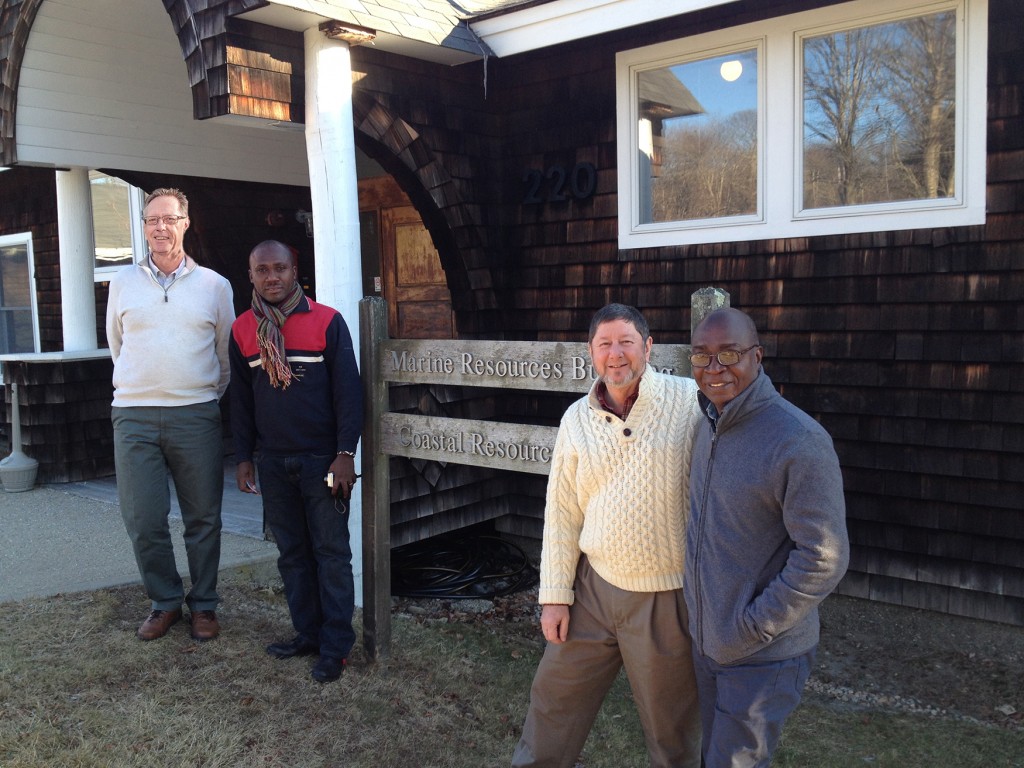
Fisheries experts Dr. Denis Worlanyo Aheto and Dr. John Blay of the University of Cape Coast (UCC) in Ghana braved the snow and cold to travel to URI in early January to study models of integrated coastal management and outreach programs and to foster research cooperation and learning opportunities for students at both universities.
“Our primary objective is to look at the various models for how universities can support capacity building in fisheries and coastal management,” said Aheto, head of the department of Fisheries and Aquatic Sciences at UCC and project manager at UCC’s new Centre for Coastal Management, funded by the United States Agency for International Development (USAID). Fisheries capacity building, research and extension are at the core of the center’s mission, said Blay, UCC fisheries professor and coordinator of the new center, and URI and Rhode Island are leaders in those areas.
The Coastal Resources Center (CRC) at URI’s Graduate School of Oceanography hosted the men for a week as part of CRC’s USAID/Ghana Sustainable Management Fisheries Project (SFMP). Aheto and Blay held discussions with faculty and top administrators across URI, met with members of the Commercial Fisheries Research Foundation and Save the Bay, visited National Oceanic and Atmospheric Administration and Department of Environmental Management offices and learned about Rhode Island Sea Grant’s extension and outreach work. “The Sea Grant model is fantastic,” Blay said.
“The role of the state is very strong in driving research in fisheries (in Rhode Island),” Aheto observed. “We would like to adapt this to the situation in coastal Ghana.” They said the URI and Sea Grant experiences have provided them with a framework for addressing the challenge of bringing the government of Ghana on board in terms of commitment and funding for fisheries and coastal management and overcoming the lack of connection among organizations. “That is really the issue (in Ghana), the need to establish a strong connection. There is too large a gulf between the university, the government and the fishermen,” Aheto said.
“The Commercial Fisherman’s Research Foundation is very interesting” in its strong connections to URI and fisheries research, Blay said. “In Ghana the fishermen are not seeing the university as a resource.” That lack of integration translates to a lack of support for university research, the men say, and they want to change that.
Aheto said Rhode Island and Ghana do share similarities when it comes to fisheries and coastal management. “We have the building blocks of a good system in place. We have UCC; we have a ministry of fisheries; we have fishermen’s organizations. The structure is in place, the problem is to bring up the capacity of the people in these institutions.”
Developing that capacity is where the role of URI is particularly important. One of the goals of the five-year SFMP initiative is to strengthen UCC’s fisheries and coastal management department by hosting up to 10 masters and doctoral students from UCC at URI, sponsoring other student and faculty exchanges, conducting joint research and holding a fisheries leadership course in Ghana that draws on URI’s experiences.
Such capacity building already is underway. Next month UCC students begin SFMP fieldwork in two estuary areas in Ghana, said Najih Lazar who is transitioning from the URI Fisheries Center to join SFMP in Ghana as fisheries advisor. “We will focus on applied research, working directly with two communities. UCC students will collect data from fishermen and exchange information with them,” explained Lazar.
Back in Ghana, Blay and Aheto will share what they have learned with their colleagues and counterparts in the government and make their case for outreach and integration. “We are going to make ourselves relevant through discussions with government and fishers and get the dialogue going,” Blay said.
UCC’s Center for Coastal Management already is gaining momentum, they said. The fisheries and coastal management department has bought three vehicles that will allow its 50 undergraduates and 20 graduate students access to field sites for research, and laboratories are getting new equipment and renovation. “We are like new kids on the block. There is much to be excited about,” Aheto said.
Partners Emphasize Cooperation, Collaboration at Ghana SFMP Meeting
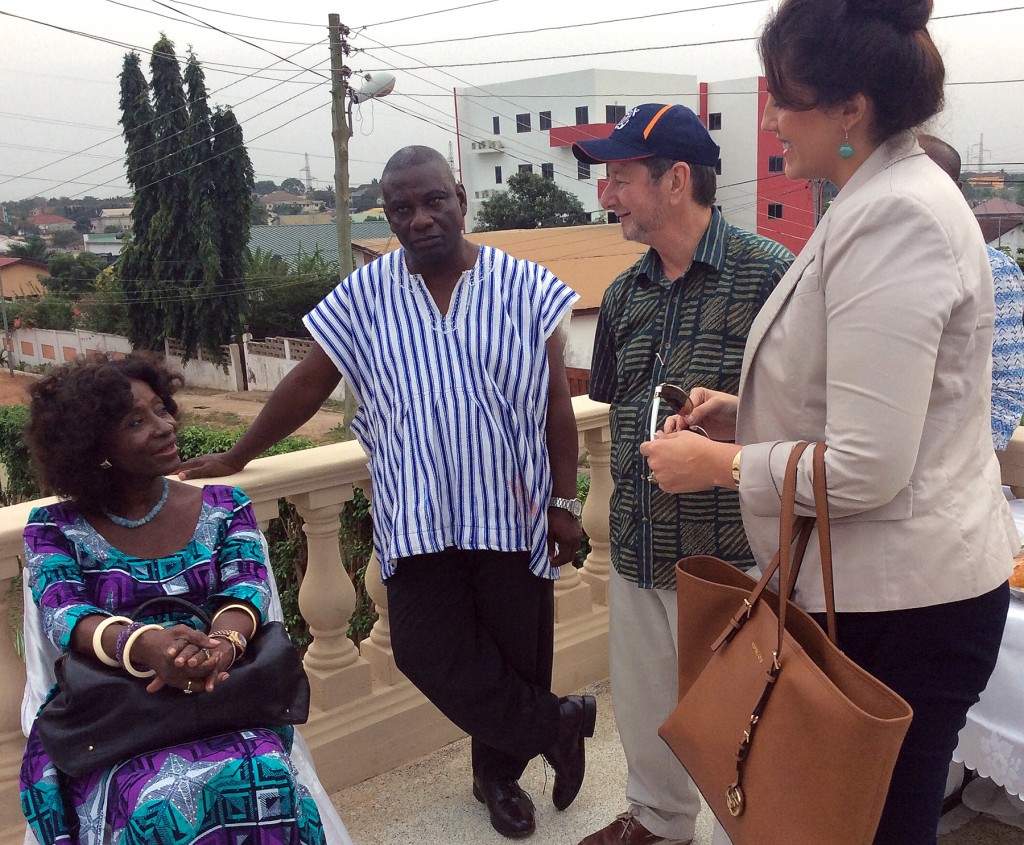
More than 40 members from the nine local and international partners implementing the USAID/Ghana Sustainable Fisheries Management Project (SFMP) were joined by USAID and Government of Ghana officials at a retreat in Accra, Ghana, Feb. 25 and 26 that combined fruitful discussions, technical presentations, role-playing and sharing of knowledge and expertise.
Ghana’s Minister of Fisheries and Aquaculture Development, Hanny-Sherry Ayitey, and other ministry officials attended a reception at SFMP’s Accra office following the retreat.
CRC is the lead implementer of the project, and the center’s Brian Crawford and Najih Lazar have relocated to Ghana as SFMP’s chief of party and national fisheries manager, respectively.
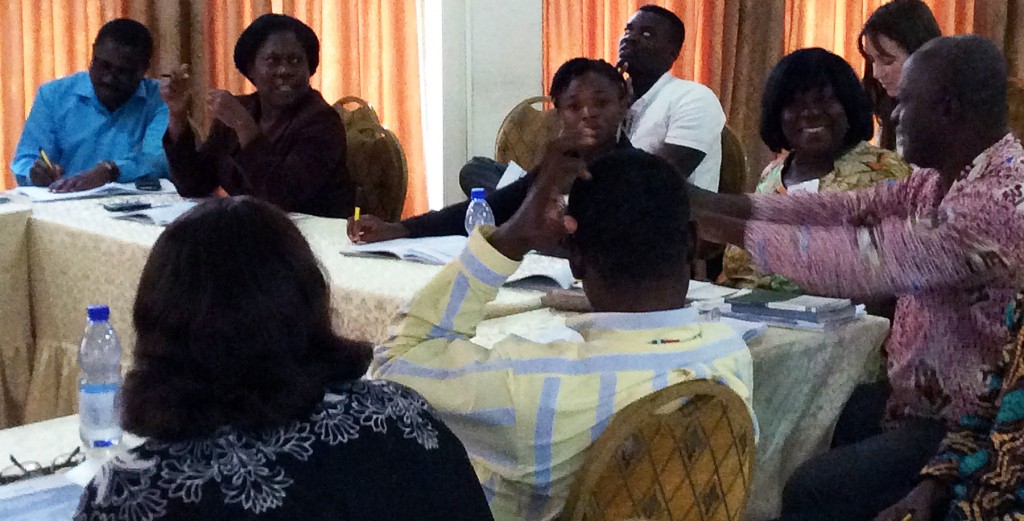
Objectives of the meetings were to understand better the marine fisheries context and other donor projects supporting Ghana’s sustainable fisheries efforts, to foster teamwork and activity execution and to understand policies, procedures and requirements of the five-year project. SFMP’s main objective is to rebuild Ghana’s collapsing fisheries stocks, with an initial focus on small pelagics—a key food and protein source throughout the region that is critical to Ghana’s food security. In this way, SFMP contributes to USAID/Feed the Future, the U.S. government’s global hunger and food security initiative.
Officials and participants acknowledged that the team has a demanding and large task before it, with difficult decisions and measures ahead. Officials and project leaders stressed that coordination and cooperation are integral to project success, particularly given the number of partners and activities. Key SFMP activities include improving legal conditions for implementing fisheries co-management, use rights and effort-reduction strategies; enhancing information systems and science-based decision-making and increasing public support and political will needed to make hard choices and change behavior. These components feed into applied management initiatives for targeted fisheries ecosystems.
Rhode Island-based CRC staff Donald Robadue, SFMP project manager; Cindy Moreau, CRC business manager; and Carol McCarthy, CRC communications specialist, traveled to Ghana to participate in the retreat. Partners embraced the spirit of collaboration solidified in the meetings and immediately got to work the next day in more informal, activity-focused meetings at SFMP’s Accra office.
CRC Leads Fisheries Course in Bangladesh
CRC and URI Fisheries Center staff joined partners on the Enhanced Coastal Fisheries (ECOFISHBD) project in Barisal, Bangladesh, to conduct a three-week fisheries stock-assessment training course in June.
CRC project manager Jim Tobey and Kathy Castro and Barbara Somers of URI’s Fisheries Center led the training course for 30 Bangladesh fisheries professionals.
The program combined classroom work with one-on-one instruction and fieldwork that also engaged local fishing community members. “This was the first trip for us to Bangladesh. We had prepared extensively by collecting all available published information about the hilsa fisheries, stock assessment and fish biology,” Castro said.
The program consisted of morning classroom sessions, followed by computer work in the afternoon. Halfway through the course, participants worked on an applied problem to help them synthesize knowledge and understand applications.
Adapting to the differing skill levels and backgrounds of the students, Tobey, Castro and Somers adjusted their teaching methods and supplemented classroom lectures with additional integrated hands-on experience and field sessions.
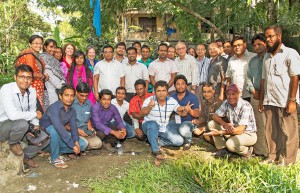
They also had to overcome logistical challenges that included power outages and flooding in the classroom building after heavy rains. Despite the challenges, participants gave the course positive marks, finding particular value in the one-on-one attention and seeking a follow-up refresher to retain and build on their skills.
CRC is a sub-grantee of ECOFISHBD , five-year initiative of USAID, WorldFish and the Government of Bangladesh that supports coastal capture fishing communities and other ecosystem users and key stakeholders to improve the resilience of the Meghna River estuarine ecosystem and the livelihoods it supports. ECOFISHBD aims to improve science-based fisheries decision-making; strengthen fisheries adaptive co-management; and enhance the socio-economic resilience of hilsa fishing communities.
Software, Statistics and Sustainability
Daven Amin, a grad student studying statistics and computer science in the College of Arts and Sciences, spent two months in Ghana helping to create a survey of fishermen that will be administered by local CRC staff to measure the progress and success of the CRC-led Sustainable Fisheries Management Project. Daven lived with a local co-worker, spent long days in an office creating the survey, and was challenged in selecting a random sample of people to survey because there are no street addresses there. Electricity is also unreliable, so creating and training staff to administer the electronic survey using tablets was also a challenge. Because it’s a paperless survey, the data immediately go to a cloud where it can be analyzed in real time.
Learn how the project gave him a chance to put his skills to use in a unique place.
Ghana Fisheries Course Stresses Inclusion, Cohesion
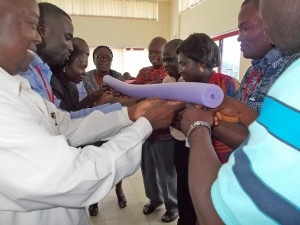
If a problem is systemic, then addressing it at identified critical points might be the best way to solve it. The URI Coastal Resources Center (CRC)-led Leadership for Fisheries Management program that recently concluded in Ghana, Africa, took that approach, both in and out of the classroom.
CRC, based at the Graduate School of Oceanography, and the College of the Environment and Life Sciences’ Fisheries Center have come together for years to offer such programs on campus and across the globe. This 10-day Ghana course differed a bit in that it brought together two dozen participants from all parts of the Ghanaian fisheries system (and one from Malawi)—from chief fishermen and women processors in villages, to boat owners, to government officials and representatives from non-governmental organizations.
“One of the strengths was that you had people from throughout the system, and you had everyone talking to each other, which is unique for Ghana,” said Glenn Ricci, a coastal manager at CRC and co-leader of the course along with Kathy Castro of the Fisheries Center.
In addition, the course was offered early in the tenure of the CRC-led USAID/Ghana Sustainable Fisheries Management Project (SFMP), which aims to help Ghana rebuild its collapsing small pelagic fishery, providing a broad window of opportunity for learning and implementation. “The primary difficulty is that even though there are strict rules and regulations in place, very few people are complying with them,” Castro said. SFMP and the fisheries leadership courses strive to change that.
The program, hosted at the University of Cape Coast (UCC), included faculty participants with the aim of building their capacity to offer these courses in the future. Next year, SFMP and UCC will co-facilitate and jointly implement the course.
Unlike some of the fisheries management programs CRC offers, which focus more on the technical aspects of fisheries, this course focused more on building leadership skills and empowering participants to understand that they can influence behavior throughout the fisheries system. The program covered how to influence people, how to understand your role in influencing positive behavior change, how to address conflict through finding common interest and understanding with those you might think you share no common ground.
With SFMP now underway, “there will be a great deal of follow on. We will offer programs like this twice a year. We want to create a group of 100 leaders throughout the fisheries system, strengthen their knowledge and ability to influence discussions from the local to the regional and national level. The courses are just a small part of a larger capacity development strategy to foster learning outside of the classroom,” Ricci said.
Ghana’s small pelagic fishery is crucial to its food security, and with SFMP, the timing is perfect for supporting a cadre of local people who can lead the country toward some tough decisions on how to reduce fishing effort in hopes of rebuilding fish stocks. For a renewed strategy to work, all stakeholders throughout the fishery system have to believe in the actions, despite low levels of trust and a history of ineffective management. Improved relations across the fishery system can make a new small pelagics fishery management plan more meaningful going forward.
In addition to classroom instruction in leadership, goalsetting, developing co-management plans and creating action plans, the group did a preliminary community analysis and then ran a stakeholder meeting in the fishing village of Elmina, Castro explained. This gave them hands-on experience to understand how local people see the way forward, what their visions are and to learn to listen more and talk less: a skill critical to being a successful leader. “It was very good for them to talk and listen to each other,” she said.
One message that emerged is that women fish processors have a good deal of power in the fisheries system. Many own boats and decide what fish to buy. “If organized, they could really influence the system,” Ricci said, much as the women in Cayar, Senegal, have as part of the CRC-led USAID/COMFISH project.
SFMP is there to guide and support Ghanaians’ progress toward a sustainable fishery, “but really it’s for them to do,” Ricci said. “The goal is to develop a viable network of informed, motivated people that understand the fisheries system and the power of vision driven changes.”
Throughout the tenure of SFMP, which concludes in 2019, CRC will return to Ghana with additional programs that build individual capacity that then strengthens the organization and ultimately the institutions and networks made up of those individuals and groups.
“It’s the follow-up, learning by doing method. It’s the CRC way,” Ricci said.
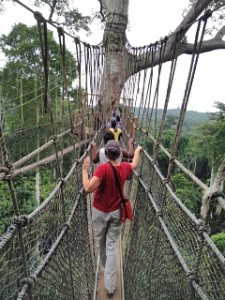
Broad Effort, Local Knowledge Creat Robust GIS-Mapping of Malawi’s Great Lakes
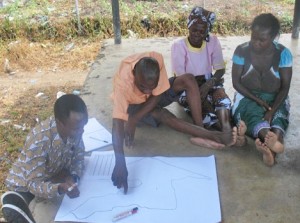
What goes into creating habitat and biodiversity hotspot maps of the vast ecosystem of Malawi’s long, narrow, biodiverse Great Lakes region? Start with four CRC staff members, five diligent extension officers working for the nation’s Department of Fisheries, three conscientious field assistants, one month in the field, four distinct lake habitats, eighteen communities, 36 focus groups, 36 individual maps, 30 workshop participants, countless hours of travel, information gathering and data analysis, a strong commitment from the Malawi FISH Project team, and local communities generously sharing their local knowledge.
CRC’s Glenn Ricci, Coastal Manager, Daniel Jamu, FISH Deputy Chief of Party, Cathy McNally, post-doctoral fellow, and graduate student Bill Favitta (Master’s of Environmental Science and Management, CELS) spent most of July and part of August working hand in hand with the local Malawian field team. Together they gathered and processed information from local shoreline communities and scientists in Malawi, using GIS technology to map the massive freshwater lakes. Their work is part of the United States for International Development (USAID)-funded Fisheries Integration of Society and Habitats Project (FISH). CRC is providing technical expertise developing sustainable fisheries management plans for the five-year biodiversity and climate change adaptation project led by PACT, an international NGO. It is CRC’s first foray into a freshwater environment.
The CRC team started with a foundation of local ecological knowledge amassed earlier in the year via a suite of participatory rapid appraisal (PRA) methods carried out by the in-country field team comprised staff from PACT and the Department of Fisheries. In each community, the team convened focus groups engaging the village chief, Beach Village Committee Members, fishermen, women processers and fish traders in mapping exercises to compile fish species-specific information as well as habitat knowledge best mined from local people. “The field team started with a blank piece of paper that had only an outline of the lake, and asked the community members to share their perceptions and insights with them,” McNally said. For example, community members know their lakes the way others know their city block. Where are the rocky areas, the deep areas, important aquatic vegetation? What habitats do the fish harvested by artisanal fishers use for mating, nursery grounds, and adult feeding areas?
The habitat information and species-specific life-stage habitat requirements collected from the communities were compiled and used to create a number of GIS data layers. Favitta took the data synthesized by the field team for each lake and created eight separate maps, a habitat and biodiversity hotspot map for each lake. The resulting maps were validated by the communities during follow-up visits and were corroborated and augmented with additional information provided by local fisheries experts in a two day workshop.
“We went out to make links between fisheries species and habitats and identify where the main biodiversity hotspots are in each lake,” Favitta said. For two of the more remote lakes—Chiuta and Malombe—this was the first effort to map their habitats. “The local residents and fisheries extension officers were really excited to be a part of it,” he said. The local knowledge was crucial.”
And the information they shared enriched the work. “The amount of primary data collected from the local communities to create these maps and document their perceptions of the greatest threats to their resources added a greater level of meaning to the work, and validated and expanded upon other research conducted in the region”, McNally said.
The project team also asked the communities to describe any efforts that they had taken to date to mitigate the most pressing threats to the fisheries and reflect upon intrinsic strengths that the FISH project could build upon.
“I think the comprehensive, multidisciplinary approach, looking at the issue through multiple lenses—biodiversity, climate change, co-management, community resilience—also set the work apart,” Favitta said.
“There was a lot of enthusiasm exhibited by the local communities and fisheries extension staff,” McNally noted. “It was informative and fun to watch the fisheries extension staff employing different techniques to draw out the information from the communities and exciting to see them take full ownership of the PRA activities and follow-up validation visits.”
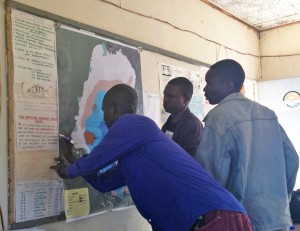
Scientists and fisheries researchers then reviewed the maps and data and provided feedback during a stakeholder workshop. Favitta eventually pulled together all the information gathered, digested and validated to build comprehensive GIS-based maps of the four lake ecosystems. Favitta, Ricci, McNally and the field team then continued sharing that feedback with the local communities. So far, the in-country project team has visited 13 of the 16 communities involved.
“I was surprised to see just how closely the local ecological knowledge gathered from the communities overlapped with the information shared by the local fisheries scientists, and hope that this encourages others to meaningfully involve local community members,” McNally said.
Working closely with the communities was a highlight for Favitta. “It provided a great perspective on the people that will be supported by the FISH project.”
Based on the accuracy and breadth of information gathered, the FISH project will be able to go into the communities and propose joint practical solutions to the threats identified by the communities. For example, one idea to help mitigate the pervasiveness of illegal fishing is to create “bush parks’ in the lakes as a deterrent. A bush park is a framework built in the water and filled with woody debris that eventually becomes covered in algae, which attract fish for feeding. “It serves as both a deterrent for illegal fishing activities while also boosting the local fish resources. These help protect local community’s waterways and resources for the local people,” Favitta said.
Back in Rhode Island, the CRC team is writing up the findings, which will highlight the community’s input and ideas and help to guide project activities going forward. The next stage of the project will use the maps and data to determine what interventions, such as “bush parks,” should be pilot tested and perhaps scaled up during the life of the project.
“It’s one step in the dialogue of what kind of project interventions can be pursued with the local communities to address the greatest threats facing them,” McNally said.
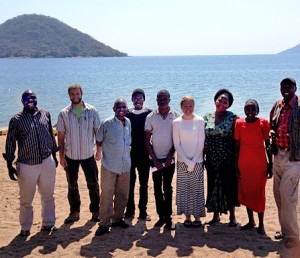
Senegal Makes History with Approval of Sardinella Management Plans
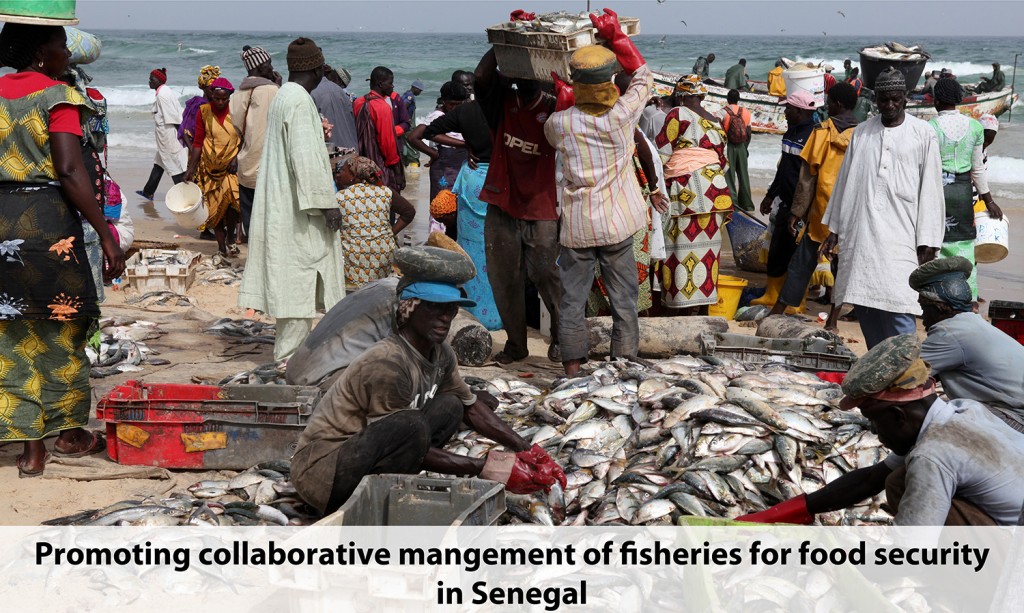 Two years of persistent, participatory work guided by the Coastal Resources Center (CRC) have culminated in a historic approval of fishery management plans in Senegal.
Two years of persistent, participatory work guided by the Coastal Resources Center (CRC) have culminated in a historic approval of fishery management plans in Senegal.
On September 30, the Minister of Fisheries and Maritime Economy signed and formally approved three sardinella collaborative Fishery Management Plans for the fishing zones of the Petite Cote, Grand Cote and Cap Vert. These three zones make up a majority of sardinella landings and represent key supporting management mechanisms to the national sardinella management plan.
The approval is a result of the two-year inclusive, participatory, and capacity building process for fisheries co-management guided by USAID/COMFISH initiative implemented by CRC, which is part of the University of Rhode Island’s Graduate School of Oceanography.
Approval of the plans represents a unique achievement in one of the most important marine fisheries in Africa. Local fisheries governing bodies, known as Local Artisanal Fisheries Councils, have developed and will implement the management plans.These plans and the process for their development have the potential to be a game-changer in Senegal’s fisheries sector and are concrete symbols of the trust and appreciation from partners and beneficiaries for the partnership effort.
Sardinella is a pelagic species of great importance to the Canary Current marine ecosystem. The species alone accounts for over 80 percent of fish landings by artisanal fishers in Senegal, and is one of the main sources of animal protein in Senegal – over 70 percent. The management plans are a boost to long-term food security in the country. They serve the goals of safeguarding livelihoods for communities working in all aspects of sardinella fisheries (including small-scale fish processing), and optimizing revenues produced by fisheries resources while helping keep fisheries stocks in good health.
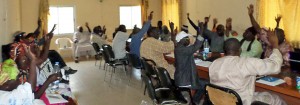
USAID/COMFISH (United States Agency for International Development/Collaborative Management for a Sustainable Fisheries Future in Senegal) is working with local fisheries actors and relevant fisheries departments to promote the development of similar participatory plans for other sardinella fishing zones, and to develop collaborative management plans for the estuarine species locally called bonga (a shad species).
USAID/COMFISH is a five-year project funded by USAID to support the collaborative and sustainable management of fisheries in Senegal. CRC implements the project in partnership with national and local actors in Senegal.


